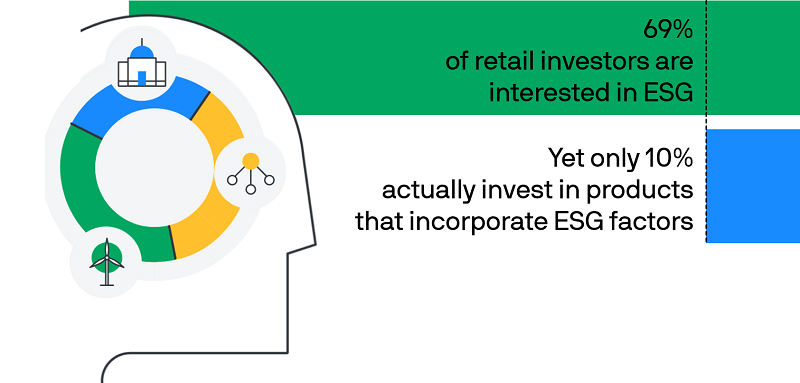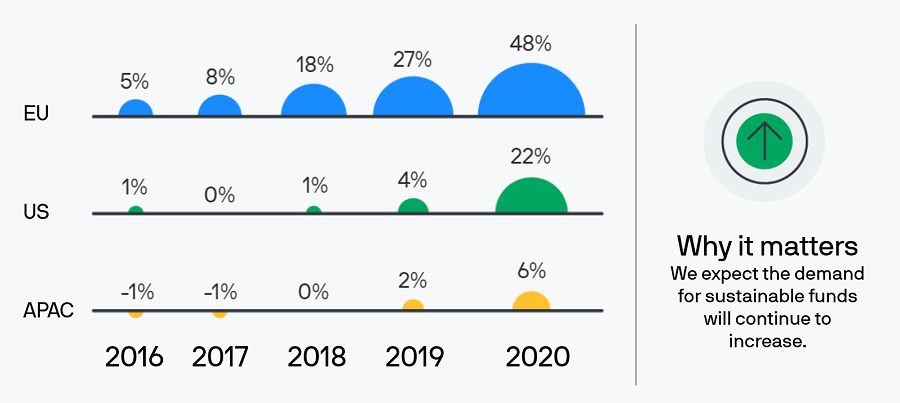Portfolio Chart: A menu of options as bond yields reset higher
With yields hovering close to decade highs across many fixed income sectors, investors are presented with a “menu of options”. Still, selectivity matters as recession risks loom.






May 2022 (3-minute read)

Key takeaways:
Consumers are increasingly opting for more sustainable choices in their daily lives, from reusable shopping bags to plant-based meat substitutes1.
Companies are factoring sustainability into their long-term investment plans, such as incorporating goals to achieve net-zero carbon emissions and reduce waste. In parallel, Governments around the world are making policy decisions to support and encourage the transition to a low-carbon economy.
From consumers to policymakers, many economic actors are backing sustainability, and this is creating a powerful portfolio opportunity.2
Why E, S and G matter in investing3?
ESG considerations are affecting consumer preferences and public attitudes. When making investment decisions, ESG factors are playing an increasingly crucial role.
How can investors capitalise on this trend? We share a few essential reasons that can help investors understand the growing importance of ESG investments in portfolios.
Interested but not fully reflected in investment decisions

Source: CFA Institute, 18.06.2020. Provided to illustrate macro trends, not to be construed as offer, research or investment advice.
1. ESG creates significant opportunities for those at the forefront of change
Increased capital flows into the energy transition

Source: Bloomberg NEF, BP Statistical, Eurostat, Lazard, METI, J.P. Morgan Asset Management. Storage, electrification, other includes hydrogen, carbon capture and storage, energy storage, electrified transport and electrified heat. Data are as of 30.06.2021. Provided to illustrate macro trends, not to be construed as offer, research or investment advice. Currency is in US dollars.
JPMorgan Global Macro Sustainable Fund seeks to capitalise on global themes that help drive return opportunities within a sustainability framework.

2. ESG is changing the nature of investment flows
Share of total net flows into sustainable strategies
Source: J.P. Morgan Asset Management, Morningstar. Data as of 30.06.2021. Provided to illustrate macro trends, not to be construed as offer, research or investment advice.
Conclusion
Incorporating ESG criteria into investing is as much about doing well as it is about doing good. Through sustainable solutions, investors can allocate their investments to asset classes, companies and regions that are taking positive steps to addressing these global issues.
Provided for information only based on market conditions as of date of publication, not to be construed as investment recommendation or advice. Forecasts, projections and other forward looking statements are based upon current beliefs and expectations, may or may not come to pass. They are for illustrative purposes only and serve as an indication of what may occur. Given the inherent uncertainties and risks associated with forecast, projections or other forward statements, actual events, results or performance may differ materially from those reflected or contemplated.
Investments involve risks. This includes illustrations of macro trends which may or may not come to pass. Investors should seek professional advice before investing. The manager seeks to integrate environmental, social and governance (“ESG”) factors in the investment process. ESG integration is the systematic integration of material ESG factors in company/issuer selection through research and risk management. It involves proprietary research on financial materiality of the ESG factors in relation to the relevant company/issuer and discretion to invest regardless of whether the company/issuer may be positively or negatively impacted by the ESG factors. Integration of ESG factors in does not imply ESG factors as the sole investment focus. Please refer to the offering documents for more details on the ESG approach.
1. Source: J.P. Morgan Asset Management, “Selecting stocks for an environmentally sustainable future”, December 2021.
2. For illustrative purposes only based on current market conditions, subject to change from time to time. Not all investments are suitable for all investors. Exact allocation of portfolio depends on each individual’s circumstance and market conditions.
3. Source: J.P. Morgan Asset Management, “ESG Explained - 7 Essentials You Need to Know”, September 2021.
© 2022 All Rights Reserved - JPMorgan Asset Management (Australia) Limited ABN 55 143 832 080, AFSL No. 376919
The information provided on this website is general in nature only and does not constitute personal financial advice. The information has been prepared without taking into account your personal objectives, financial situation or needs. Before acting on any information on this website you should consider the appropriateness of the information having regard to your objectives, financial situation and needs. Therefore, before you decide to buy any product or keep or cancel a similar product that you already hold, it is important that you read and consider the relevant JPMorgan fund Product Disclosure Statement (PDS) and Target Market Determination, which are available to download on this website and make sure that the product is appropriate for you. Before making any decision, it is important for you to consider these matters and to seek appropriate legal, tax, and other professional advice.
With yields hovering close to decade highs across many fixed income sectors, investors are presented with a “menu of options”. Still, selectivity matters as recession risks loom.
After a difficult year for bonds, we explain why fixed income could once again prove to be a useful diversifier for portfolios.
As the Fed’s rate hike cycle concludes, bonds can present an important source of income and diversification for portfolios.
We explain why investors should pay greater attention to quality bonds.
We share insights on how actively-managed fixed income ETFs can help build stronger portfolios.
Here is a chart indicating IG bond opportunities as US Treasury yields stay elevated.
Employing an equity premium income approach in an income-hungry world.
We share a flow chart to help explain ETF liquidity.
Seeking income as the outcome is the aim of our actively managed equity premium income ETF strategy.
Flexibility is at the heart of our approach to fixed income markets.
We share our insights on optimising call options in equity income ETFs.
We share the basics of call options in equity income ETFs.
We share the basics about thematic ETFs and how they are employed in portfolios.
Income investing can help tap investment opportunities while managing volatility through cash flows from a diversified portfolio of income generating assets.
Income investing remains relevant in the current market environment, as volatility is poised to remain elevated.
We believe that quality and yield opportunities can still be found in bonds.
We share how we consider the risks and opportunities in climate change investing.
We discuss five megatrends related to climate change and the investment implications.
We share our views on the fixed income themes and opportunities in current choppy markets.
Fixed income isn’t just government or corporate bonds, it also includes non-traditional debt securities.
The securitisation market has regained much ground in the past decade.
Harnessing an active equity ETF to seek out low-risk alpha in a high-risk world.
Employing a macro process sustainably to help investors align their goals with their values.

For more information, please call or email us. You can also contact your J.P. Morgan representative.
1800 576 100 (Application enquiries)
